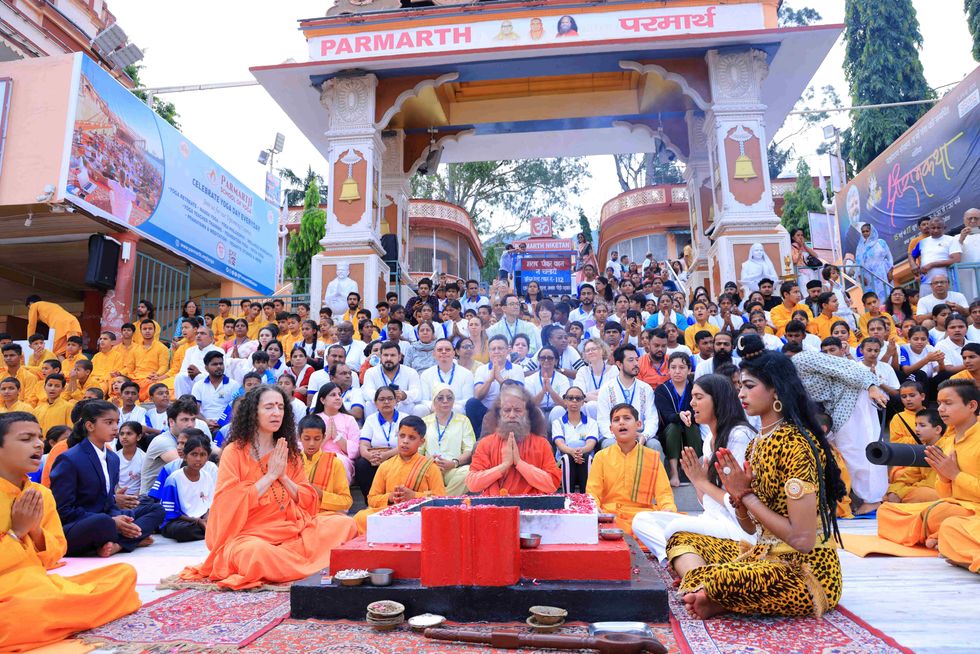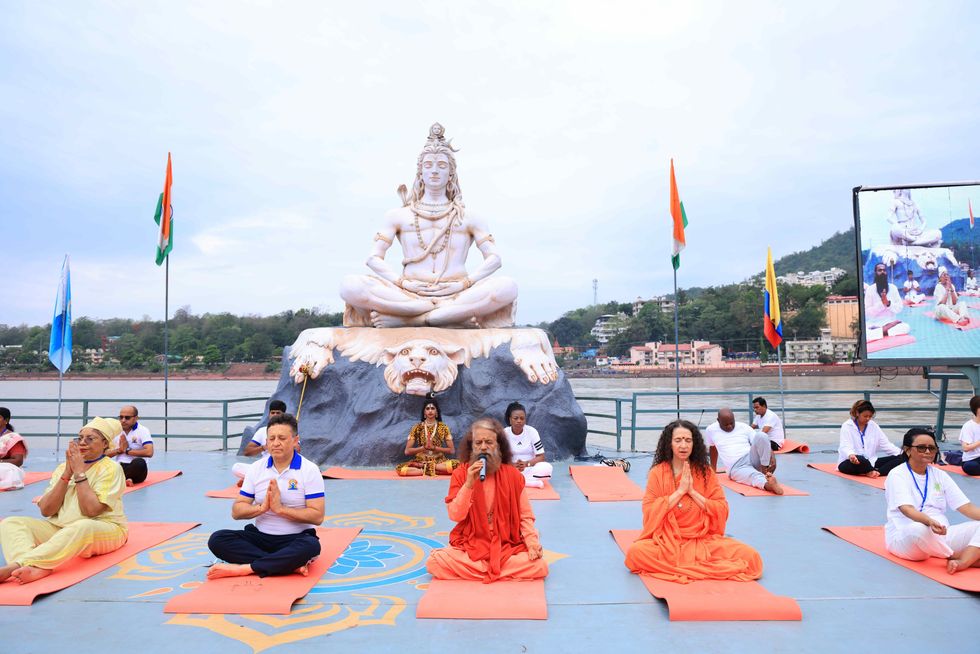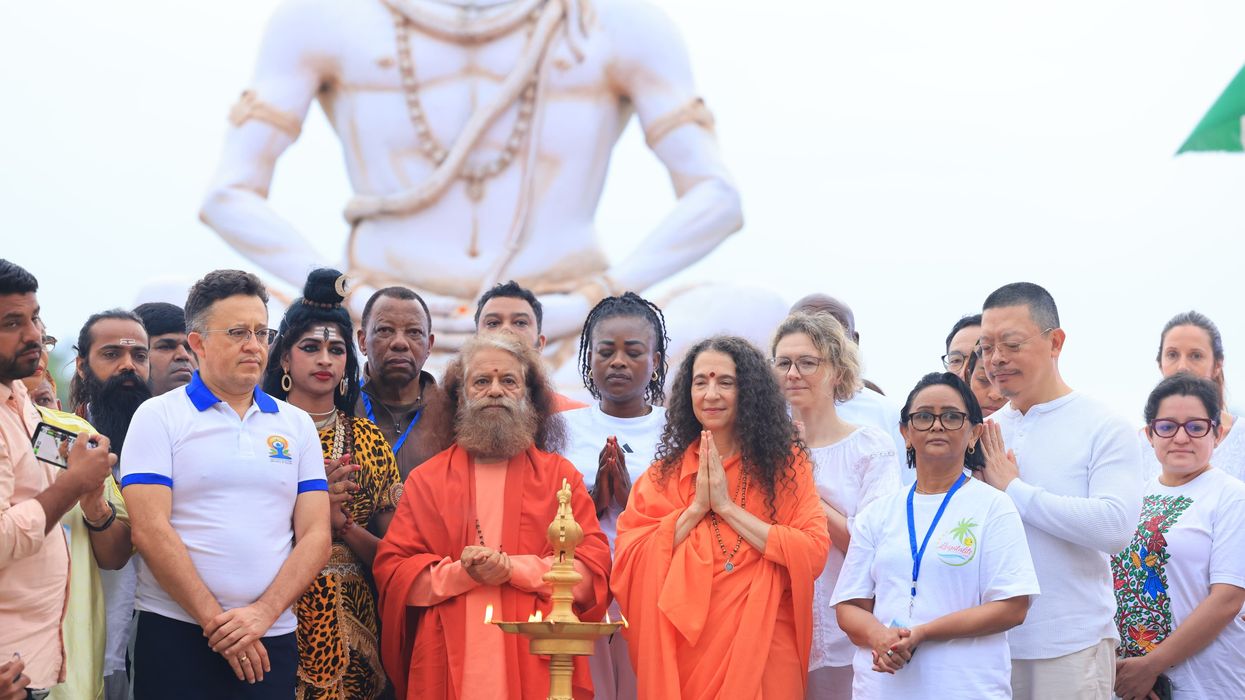Key points
- The 11th International Day of Yoga was celebrated at Parmarth Niketan, Rishikesh
- Ambassadors, high commissioners, and guests from over 25 countries participated
- The event followed the global theme: “Yoga for One Earth, One Health”
- The Common Yoga Protocol was conducted by trained instructors with government audio
- Swami Chidanand Saraswati Ji and Sadhvi Bhagawati Saraswati Ji led the spiritual programme
- Celebrations concluded with a World Peace Yajna and the national anthem
A global gathering on the banks of the Ganga
Rishikesh, 21 June – The 11th International Day of Yoga was marked by a large-scale, spiritually uplifting gathering at Parmarth Niketan Ashram on the banks of the River Ganga. Diplomats, dignitaries, and yoga enthusiasts from over 25 countries participated in the celebration, which followed the global theme of “Yoga for One Earth, One Health”.
The event began with the lighting of the ceremonial lamp and the recitation of Patanjali’s Yoga Sutras. The session featured the Common Yoga Protocol conducted by trained instructors to the government-issued audio guide.
Parmarth Niketan’s President, Pujya Swami Chidanand Saraswati Ji, and Sadhvi Bhagawati Saraswati Ji presided over the gathering and delivered spiritual discourses on the deeper significance of yoga.
The message of harmony and global health
This year’s theme highlights the link between individual well-being and planetary health. Addressing the participants, Swami Chidanand Saraswati Ji remarked, “When we take care of ourselves, we begin to care for the Earth. This is the divine message of Indian culture — Vasudhaiva Kutumbakam, the whole world is one family.”

He described yoga as a gift from India to the world, bringing together the body, mind and consciousness through ancient physical, mental and spiritual disciplines.
Sadhvi Bhagawati Saraswati Ji added, “Yoga is not just a physical practice to increase flexibility, but a complete lifestyle. It allows us to remain balanced in the face of challenges, and helps us live with more focus, patience, and peace.”
A tradition recognised by the United Nations
International Yoga Day was first adopted by the United Nations General Assembly on 11 December 2014, following a proposal from India that was co-sponsored by 177 countries. At the time, Prime Minister Narendra Modi called yoga “an invaluable gift of our ancient tradition,” highlighting its holistic approach to well-being.
The Rishikesh event featured a special video message from Prime Minister Modi, along with a musical performance on the flute, guided yoga demonstrations, and reflections from various spiritual and yogic leaders.
A diplomatic and cultural moment
Dignitaries in attendance included representatives from Mexico, Peru, Japan, Colombia, Zimbabwe, Seychelles, Nepal, Botswana, Uzbekistan, Namibia, Ecuador, Kazakhstan, Belarus, Ethiopia, and several other nations. Their participation underlined yoga’s growing international appeal and its role in diplomacy and cultural exchange.
Many of the guests shared their appreciation for India’s leadership in promoting wellness through yoga and called the celebration a symbol of shared human values and interconnectedness.
Participation from schools and yoga institutions
The event also saw active participation from students, teachers, and instructors from educational institutions, yoga schools, and local associations across Uttarakhand. Parmarth’s own Yogacharya Ganga Nandini led the Common Yoga Protocol, which was performed with devotion by hundreds on the ghats.

Groups such as the Ministry of Youth and Sports, Komaleshwar Yoga School, and the Yoga Association of Uttarakhand also contributed to the successful conduct of the session.
Concluding with a prayer for peace
The celebration concluded with a World Peace Yajna, bringing together participants in a traditional fire ritual aimed at spreading harmony and spiritual upliftment. The national anthem was sung collectively to close the event on a patriotic and unifying note.
As the sun rose over the River Ganga, the 11th International Day of Yoga stood as a powerful reminder of yoga’s enduring role in personal and collective transformation.
🔗 Watch the full event livestream here:
YouTube – Parmarth Niketan IDY 2025





